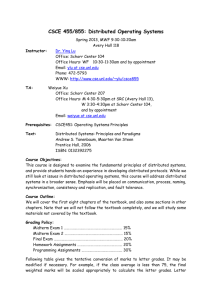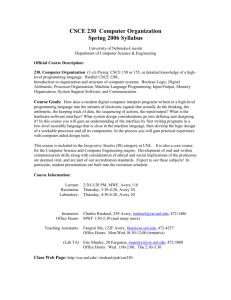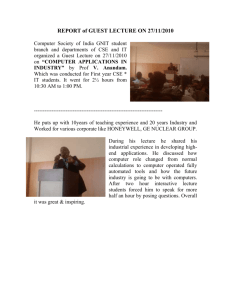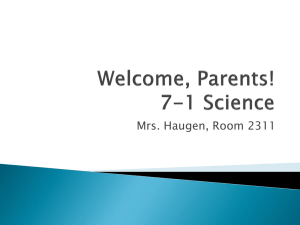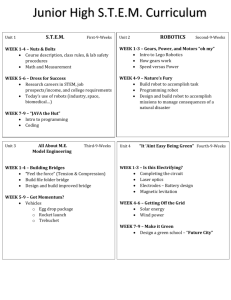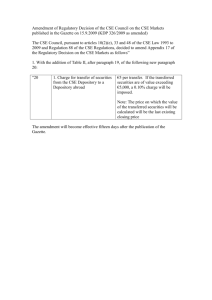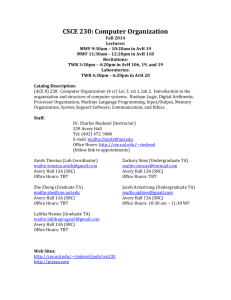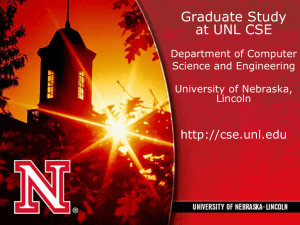CSCE 439/839: Robotics: Algorithms and Applications
advertisement
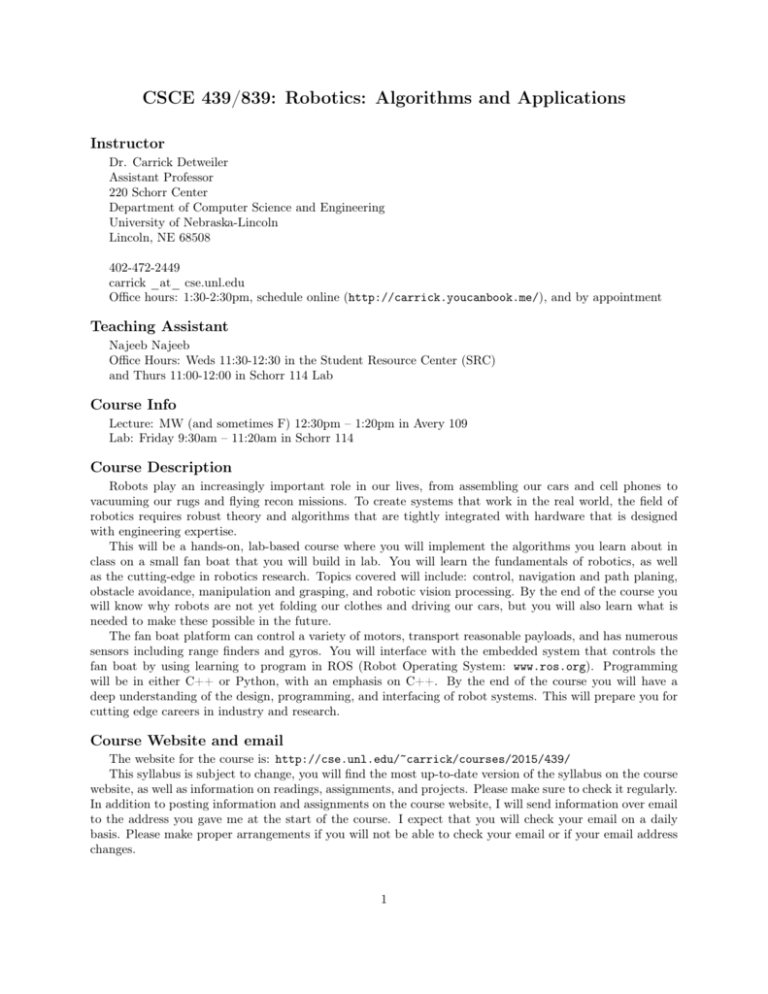
CSCE 439/839: Robotics: Algorithms and Applications Instructor Dr. Carrick Detweiler Assistant Professor 220 Schorr Center Department of Computer Science and Engineering University of Nebraska-Lincoln Lincoln, NE 68508 402-472-2449 carrick _at_ cse.unl.edu Office hours: 1:30-2:30pm, schedule online (http://carrick.youcanbook.me/), and by appointment Teaching Assistant Najeeb Najeeb Office Hours: Weds 11:30-12:30 in the Student Resource Center (SRC) and Thurs 11:00-12:00 in Schorr 114 Lab Course Info Lecture: MW (and sometimes F) 12:30pm – 1:20pm in Avery 109 Lab: Friday 9:30am – 11:20am in Schorr 114 Course Description Robots play an increasingly important role in our lives, from assembling our cars and cell phones to vacuuming our rugs and flying recon missions. To create systems that work in the real world, the field of robotics requires robust theory and algorithms that are tightly integrated with hardware that is designed with engineering expertise. This will be a hands-on, lab-based course where you will implement the algorithms you learn about in class on a small fan boat that you will build in lab. You will learn the fundamentals of robotics, as well as the cutting-edge in robotics research. Topics covered will include: control, navigation and path planing, obstacle avoidance, manipulation and grasping, and robotic vision processing. By the end of the course you will know why robots are not yet folding our clothes and driving our cars, but you will also learn what is needed to make these possible in the future. The fan boat platform can control a variety of motors, transport reasonable payloads, and has numerous sensors including range finders and gyros. You will interface with the embedded system that controls the fan boat by using learning to program in ROS (Robot Operating System: www.ros.org). Programming will be in either C++ or Python, with an emphasis on C++. By the end of the course you will have a deep understanding of the design, programming, and interfacing of robot systems. This will prepare you for cutting edge careers in industry and research. Course Website and email The website for the course is: http://cse.unl.edu/~carrick/courses/2015/439/ This syllabus is subject to change, you will find the most up-to-date version of the syllabus on the course website, as well as information on readings, assignments, and projects. Please make sure to check it regularly. In addition to posting information and assignments on the course website, I will send information over email to the address you gave me at the start of the course. I expect that you will check your email on a daily basis. Please make proper arrangements if you will not be able to check your email or if your email address changes. 1 Prerequisites and Requirements Prerequisites: CSCE236 or ELEC222 and CSCE 310/311 or equivalent programming experience, MATH 314, senior/graduate standing, or instructor permission Mastery of: C++ or other high-level languages, embedded systems, algorithm analysis. Familiarity with: basic and advanced data structures, GNU/Linux operating systems, software development, linear algebra. Exposure to: introductory Newtonian physics, probability and statistics. Textbooks Suggested: G. Dudek and M. Jenkin, Computational Principles of Mobile Robotics, Cambridge University Press, 2nd Edition, 2010. Topics Covered and Outcomes Topics covered will include: open and closed loop control, reactive control, localization, navigation, path planning, obstacle avoidance, dynamics, kinematics, manipulation and grasping, sensing, robot vision processing, and data fusion. See the course website for a detailed course schedule. Mastery of: algorithmic design, implementation, and adaptation to real robots operating in uncertain environments, application development on robots. Familiarity with: robot design and analysis, robot control, localization and navigation, robot vision techniques. Assignments and Grading All assignments are due via http://cse.unl.edu/handin/ Unless otherwise noted, all assignments are due before the beginning of class on the day they are due. Assignment due dates are announced in class. Your final grade will be composed of a number of components. These are: Percentage Assignment 10% Class and Lab Participation 20% Homework 45% Labs 25% Final Project/Challenge Homework There will be at least two homeworks over the course of the semester. These are individual assignments. It is ok to discuss concepts behind the problems in the homeworks with classmates, however, you cannot do them together. If you do discuss problems with classmates or other people, you must acknowledge this on the assignment (this will not lead to any grade reduction). As a metric for what level of discussion is allowed, it is ok to meet and talk over coffee about the assignment. It is not ok to show someone your solution or to work on the details of the problems together. In general any discussions should be limited to discussion and you should not be taking significant notes on the problems. If in doubt, ask me questions about assignments. Note that late homeworks will receive a 20 point deduction per day late. 2 Labs There will be three or four labs during the semester. Each lab group only needs to submit one lab report. The lab report should be well written with complete sentences and paragraphs and be readable on its own. It must contain an introduction, discussion, conclusion, as well as the answers to specific questions asked. Supporting materials such as pictures, code examples, etc. are encouraged. Each lab group will appoint a group member at the start of each lab that will be primarily responsible for collecting and organizing the lab report. Each person must do this for at least one lab during the semester. Everyone in the group must still contribute fully to doing and writing the lab, the person in charge of the lab just has the added responsibility of organizing and submitting the lab writeup. In addition to the lab writeup, you give a short, graded demonstration of your working system after handing in your lab report. Labs are due via handin before the start of class on the day that they are due. Late labs will receive a 20 point deduction for each 24 hours they are late. That means that if you turn it in after class, instead of before, your group will start with a 80% as the highest possible grade. Lab groups will be assigned at the start of the semester and will remain the same throughout the semester for the labs and final project. If you are experiencing any problems with the dynamics of your group, please let me know early so that we can address them quickly before they get out of hand. Additionally, while typically everyone in a group will receive the same grade on each lab, I reserve the right to deduct points if I feel that someone has not contributed fully to the completion of an assignment. Final Project/Challenge Details on the final project will be given in class. Overall the final project is worth 25% of your grade. The breakdown of the grading for the project is roughly: Percentage Component 5% Proposal and pre-presentation 10% Presentation and Demo 10% Project report The proposal is a short paper (2-4 pages) describing your approach to the final challenge and includes any additional sensors or actuators that you would like to add to the hovercraft. The project report is a final report describing your project and outcome. The presentation and demo will show your hovercraft and algorithms in action to the class and the broader UNL community. A short pre-presentation before the final presentation will also be given to ensure system functionality before the final presentation. The final project report and presentations will occur during the second to last and final week of class. Further details on the final project will be given in class. Class and Lab Participation Participation in class and lab is critical in this course and counts for 10% of your grade. You are expected to be prepared for class and lab, do assigned readings, and ask questions during class and lab. Simply coming to class and lab is not sufficient for obtaining full marks for participation; you should actively participate in discussions. There will be self and group evaluations of your lab team during the semester. If you do not put in the time and effort and contribute to the success of you lab group you will loose points. It is acceptable to use computers to read papers and take notes. However, I expect that their use will not be a distraction. Texting, tweeting, facebooking, etc. can wait until after class. Do not use your cell phone during class. It is obvious and is a distraction not only for you, but for me and your classmates as well. 3 Absences Students are allowed two absences during the semester. Any absences beyond this will lead to a reduction in your class participation grade. There is no exception to this, so it is best to save these days for times when you are sick and cannot come to class. You do not need to notify me if you will be absent, although it is appreciated. Not showing up for class is not an excuse for not turning in an assignment. The exception to the “free” absences is if you are scheduled to present or give a demonstration. If you do not give your presentation on your scheduled day you will receive a zero for the presentation. An absence for your presentation may be excused in the case of an illness or family emergency if acceptable written evidence is given and you notify me as soon as possible. Even if you are sick or leaving town on short notice you should be able to have a friend notify me that you will be missing your presentation. Please do so as soon as possible so that I can plan accordingly so you do not waste the time of the other students in the class. 439 Versus 839 This course is highly integrated and there are only small differences between the 439 and 839 versions of the course. For 839, the homeworks and labs will have additional questions and parts that are optional for students in 439. University Writing Center The University of Nebraska-Lincoln Writing Center can provide you with meaningful support as you write for this class as well as for every course in which you enroll. Trained peer consultants are available to talk with you as you plan, draft, and revise your writing. Please check the Writing Center website (http://www.unl.edu/writing/) for locations, hours, and information about scheduling appointments. CSE and UNL Policies The CSE Department has a Student Resource Center in Avery 13A (http://cse.unl.edu/src) where you can go for assistance with any of your courses. All students enrolled in any computer science course is bound by the Computer Science and Engineering academic integrity policy: http://cse.unl.edu/ugrad/resources/academic_integrity.php You are expected to read, understand, and follow this policy. For this course, do not plagiarize (writing or code) and make sure to properly cite any sources you use. Any cheating or plagiarism will be reported to the Chair of your department and your Dean, and will result in an F for the course. The CSE Department has an anonymous suggestion box: http://cse.unl.edu/department/suggestion.php that you may use to voice your concerns about any problems in the course or department if you do not wish to be identified. Disabilities Students with disabilities are encouraged to contact the instructor for a confidential discussion of their individual needs for academic accommodation. It is the policy of the University of Nebraska-Lincoln to provide flexible and individualized accommodation to students with documented disabilities that may affect their ability to fully participate in course activities or to meet course requirements. To receive accommodation services, students must be registered with the Services for Students with Disabilities (SSD) office, 132 Canfield Administration, 472-3787 voice or TTY. 4
